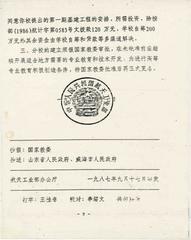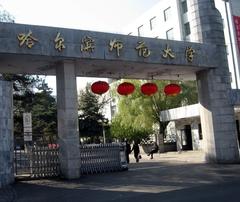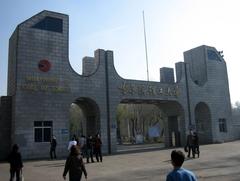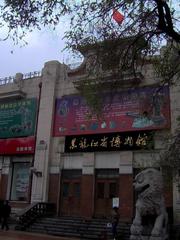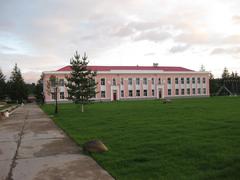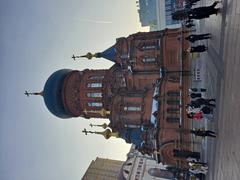Visiting the Consulate General of Russia in Harbin: Hours, Tickets, and Travel Tips
Date: 04/07/2025
Introduction
The Consulate General of Russia in Harbin is a historic symbol of cross-cultural exchange and diplomacy in Northeast Asia. Established during the era of the China Eastern Railway, the consulate helped shape Harbin’s transformation into a cosmopolitan city—often called the “Oriental Moscow”—with its vibrant mix of Russian and Chinese influences (The China Journey; China Highlights). This guide provides a comprehensive overview of the consulate’s history, architectural highlights, visiting logistics, and tips for exploring nearby attractions, ensuring a rich and informed experience for every visitor.
Table of Contents
- Historical Background
- Architectural Highlights
- Visiting the Russian Consulate in Harbin
- Practical Visitor Information
- Exploring Saint Sophia Cathedral
- Summary and Recommendations
- References and Further Reading
Historical Background
Origins and Growth
Harbin’s emergence as a major city began with the construction of the China Eastern Railway in the late 19th century, which brought a significant Russian population and a host of multinational influences to the region (The China Journey; New East Archive). The first Russian consulate opened in 1907 in the Middle East Railway Hotel (now No. 85 Hongjun Street), a prime example of Russian Art Nouveau architecture (DayDayNews).
By the 1920s, Harbin had grown into an international city, hosting consulates from 19 countries and serving as a haven for White Russian émigrés and other expatriate communities (NBPublish). The Russian consulate facilitated trade, legal matters, and cultural exchange, contributing to the city’s cosmopolitan character (New East Archive).
Political Upheaval and Transformation
The consulate’s fortunes mirrored the region’s turbulent history: after the 1917 Russian Revolution, it supported the Russian diaspora in Harbin; during the Japanese occupation (1932–1945), its influence diminished as residents faced persecution (New East Archive). The Soviet Union reinstated its consular presence in 1949, but as the Russian community dwindled, the consulate’s role shifted from diplomatic hub to historic landmark (DayDayNews).
Architectural Highlights
The Russian Consulate and associated buildings are distinctive for their blend of Russian neoclassical, Art Nouveau, and eclectic architectural styles:
- Symmetrical Facades with arched windows and ornate detailing
- Masonry Construction in muted pastel tones, typical of Russian consular buildings
- Decorative Elements such as wrought-iron balconies and intricate moldings
- Subtle Roof Domes that reference Russian Orthodox architecture (Let’s Travel to China)
These features, along with other Russian-era buildings in Harbin, contribute to the city’s unique European-style streetscape, most notably along Central Avenue (China Highlights).
Visiting the Russian Consulate in Harbin
Visiting Hours
- Consular Services: Monday to Friday, 9:00 AM – 12:00 PM; afternoons by appointment only
- General Visits: The consulate’s exterior and historic district are accessible for public viewing at all times, but the interior is restricted to official business (Russian Consulate in Harbin)
Tickets and Admission
- Exterior Viewing: Free, no ticket required
- Interior Access: Available only for consular services by prior appointment
- Nearby Museums and Exhibitions: May charge a nominal fee; check with local tourism offices for details
Accessibility
The area around the consulate is generally accessible, but some historic buildings may have limited wheelchair access. Contact the consulate in advance to arrange assistance if needed.
Guided Tours and Events
While the consulate itself does not offer public tours, local agencies and cultural organizations provide walking tours of Harbin’s Russian heritage sites, including the consulate, Central Avenue, and Saint Sophia Cathedral (Let’s Travel to China). Special events and exhibitions occasionally occur nearby; check event calendars before your visit.
Notable Photo Opportunities
- The consulate’s Art Nouveau facade
- Onion-domed churches, especially at sunrise or sunset
- Central Avenue’s European buildings and vibrant street life
Practical Visitor Information
Location
- Address: 99 Youyi Road, Daoli District, Harbin, Heilongjiang Province, China
Getting There
- By Taxi: 40 km from Harbin Taiping International Airport (45–60 min)
- By Metro: Nearest station—Harbin Railway Station, 15 min walk
- By Bus: Several city routes serve the Daoli District (China Highlights)
Consular Services and Appointments
Most consular services, including visa applications and notarization, require an appointment. Book in advance through the official consulate website or authorized visa centers (Penguin Travel).
Security and Entry Protocols
- Present valid ID and appointment confirmation
- Undergo security checks; photography inside is prohibited
- Arrive 15 minutes early to allow for screening
Language
Primary languages are Russian and Chinese; English support is limited. Bring translated documents or an interpreter if necessary.
Amenities and Nearby Attractions
- Hotels: Range from budget hostels to boutique hotels near Central Avenue
- Dining: Russian bakeries, cafes, and local Chinese restaurants abound
- Nearby Sites: Central Avenue, Saint Sophia Cathedral, Harbin Flood Control Monument, Songhua River embankment
Seasonal Tips
- Winter (Ice and Snow Festival): Dress in insulated layers, book accommodations and appointments early
- Summer: Milder weather, lush surroundings
Safety and Etiquette
- Harbin is generally safe; exercise standard precautions
- Respect diplomatic protocols—no photography of security or staff
- Dress modestly when entering official buildings
Emergency Contacts
- Russian citizens: consulate’s emergency hotline (24/7)
- Other nationals: contact your embassy
- Medical emergencies: major hospitals have English-speaking staff
Exploring Saint Sophia Cathedral
Overview
Saint Sophia Cathedral is Harbin’s most iconic Russian Orthodox church, renowned for its striking Byzantine Revival architecture. Built in 1907, it now serves as the Harbin Architectural Art Gallery and is a must-see for visitors interested in the city’s Russian heritage (China Highlights).
Visiting Information
- Opening Hours: Daily 9:00 AM – 5:00 PM (last admission 4:30 PM)
- Tickets: 30 RMB for adults; discounts for students/seniors; children under 1.2m free
- Guided Tours: Available for an additional fee—book on-site or online
Getting There
- Metro: Line 1 to Central Street Station, 10-minute walk
- Bus: Routes 1, 12, 25 stop nearby
- Taxi: Widely available
Photography & Accessibility
- Photography is allowed, but flash/tripod use may be restricted during busy times
- Wheelchair accessible, though some uneven surfaces exist
Nearby Attractions
- Central Avenue (Zhongyang Dajie)
- Harbin Flood Control Monument
- Songhua River embankment
Summary and Recommendations
The Consulate General of Russia in Harbin, alongside its surrounding historic district, offers a vivid glimpse into the city’s unique Russian-Chinese heritage (DayDayNews; New East Archive). While interior access is limited, the consulate’s architecture, its role in Harbin’s colorful past, and its proximity to landmarks like Saint Sophia Cathedral and Central Avenue make it an essential stop for travelers interested in history and culture (China Highlights; Let’s Travel to China).
Travel Tips:
- Always check the consulate’s official website for the latest hours and requirements
- Book appointments and accommodations early, especially in winter
- Explore the district’s Russian bakeries, museums, and guided tours for a richer experience
- Use the Audiala app for updated travel guides and cultural content
For the most current information, consult:
- Russian Consulate in Harbin
- Official Harbin tourism sites
- Local travel agencies
References and Further Reading
- The China Journey - Harbin
- New East Archive - Russia-China Harbin Legacy
- DayDayNews - Russian Consulate History
- NBPublish - Harbin Architectural Heritage
- China Highlights - Harbin Facts and Travel Tips
- Let’s Travel to China - Things to Do in Harbin
- Penguin Travel - Travel Guide to Russia 2025
- China Dragon Tours - Russian Consulate General
- Tourist Places Guide - Harbin Attractions
- Harbin Ice - Russian Influence in Harbin
